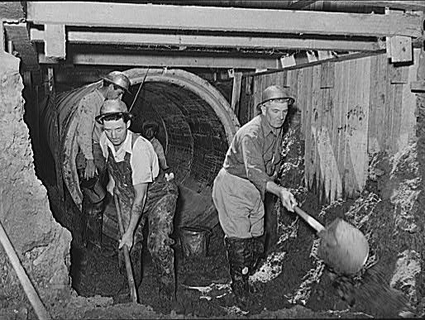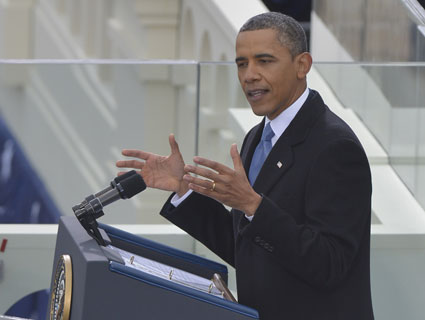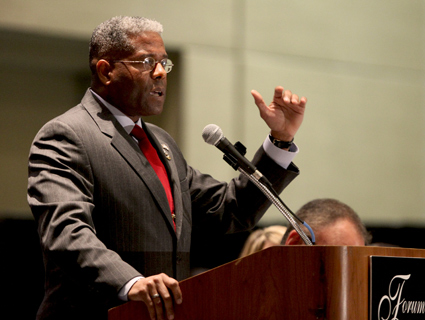
Work Projects Administration workers, San Diego, 1941.<a href="http://www.loc.gov/pictures/resource/fsa.8c01480/">Library of Congress</a>
President Barack Obama’s jobs council, a panel formed in January 2011 to gather outside expertise on job creation, is set to expire Thursday. It appears unlikely that the president will renew it for another term, but experts say that the council has been such a loser that its death might actually be a good thing.
The jobs panel, officially called the President’s Council on Jobs and Competitiveness, is made up of 26 important people from industry, labor, and academia, and was “created to provide non-partisan advice to the President…on ways to create jobs, opportunity, and prosperity for the American people,” according to its website. But the panel failed to accomplish much over its two-year life span, and a lot of what it did turn out was more friendly to business than to regular people.
The council hasn’t met in over a year (its last meeting was January 17, 2012) and has only met four times since it was created. Last summer, the White House said that the council had not convened in the past several months because the president had “a lot on his plate.” The panel has put out a total of three policy recommendation reports, but that hasn’t translated into much actual movement on jobs.
“I don’t think you could draw much of a line from the jobs council to a bunch of job creation, or even job creation policies that are on the current agenda—of which there aren’t enough,” says Jared Bernstein, the former chief economic adviser to Vice President Joseph Biden who’s now a senior fellow at the Center on Budget and Policy Priorities, a DC-based think tank.
For economist Dean Baker of the Center for Economic and Policy Research, the jobs council has proved such a political nonentity that when asked by Mother Jones for his thoughts on its expiration, he laughed. “I can’t say that I’ve given it a lot of thought,” he says. “Which I guess says a lot about it.”
The jobs council itself would beg to differ. Gary Sheffer, a spokesperson for Jeffrey Immelt, the GE CEO who chairs the panel, noted in an email that the council has made 60 recommendations for executive action and that “significant progress” has been made on 54 of those. The White House did not respond to a request for comment on whether the jobs council had achieved its goals.
Critics charge that even the relatively few recommendations that the council did draw up were not particularly helpful to ordinary Americans. The composition of the council—mostly industry CEOs from outsourcing companies, with a few representatives from labor and academia sprinkled in—forecast the business-friendly direction the council would take. Obama’s nomination of Immelt as chair cemented that pro-big-business tilt, critics said. As the Huffington Post wrote in January 2011, “Immelt’s firm…represents the archetypal company that’s hoarding cash, sending jobs overseas, [and] relying on taxpayer bailouts.”
“It’s almost an insult,” to have someone like Immelt head the panel, Baker says. “I mean, there are arguments for outsourcing, but to put someone in the job of doing that as head of the jobs council really is kind of of a joke.” (When reports came out that GE also used tax loopholes and creative accounting to avoid paying taxes in the United States, there were calls for Immelt to resign.)
Not surprisingly, the “job-creating” recommendations the council has called for include cutting regulations, slashing corporate tax rates, and ramping up the use of all “natural resources” for energy production. (House Republicans loved those proposals.) Sheffer, Immelt’s spokesman, notes that some of the council’s other ideas, including speeding up visa and patent processing, reviewing “paperwork requirements” on small business, launching “public-private partnerships,” and fast-tracking infrastructure projects, were also implemented.
“The worrisome thing is when you get these industries together, they’re going to have some good ideas, but also they’ll be angling for tax breaks,” Bernstein says. “It’s always a double-edged sword.”
AFL-CIO president Richard Trumka, one of the two labor leaders on the panel, slammed its last report, taking particular issue with its corporate tax-cut proposals: “By reducing overall revenues these reforms could easily have the opposite [of the intended] effect…starving the government of the revenue it needs to create good jobs and upgrade our infrastructure and education systems, thereby making the United States a less attractive place to invest.” When asked for the labor federation’s stance on the expiration of the panel, a spokesperson directed Mother Jones to that assessment.
The Obama administration runs a public-relations risk by letting the jobs council die when there are 12 million people unemployed and the jobless rate is still nearly 8 percent. Still, the group has been so underwhelming, Bernstein says, “If I were the president, I wouldn’t spend a lot of energy on reauthorizing it.”
Baker says it might be nice if Obama used the end of the jobs council’s term to reorient it towards actual job creation, but he’s not too optimistic. Ultimately, he says, it’s probably better to let the council fade into the ether. The whole exercise turned out to be mostly “a symbolic gesture,” he says—”and not even a very good symbolic gesture.”











